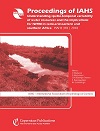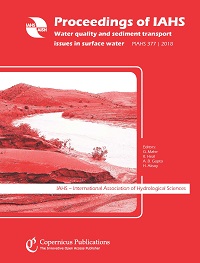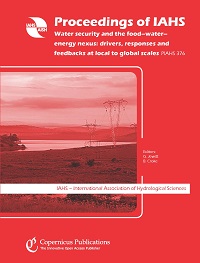IAHS News
IAHS 2017 Scientific Assembly PIAHS Volumes now available
The IAHS is pleased to announce that the three volumes of Proceedings of the International Association of Hydrological Sciences from the July 2017 IAHS Scientific Assembly in Port Elizabeth, South Africa are all now available online open access.
 Volume 378
Volume 378
Understanding spatio-temporal variability of water resources and the implications for IWRM in semi-arid eastern and southern Africa.
Editors: H. Makurira, D. Mazvimavi, J.-M. Kileshye-Onema, E. Kapangaziwiri, and W. Gumindoga
This volume contains 14 peer-reviewed papers that focus on integrated water resources management in the southern Africa region and are a culmination of extensive research in five broad themes, namely, (1) hydrological modelling (2) groundwater hydrology (3) application of earth observations in water resources assessments (4) water allocation and use and (5) water quality management. Southern Africa offers wide research opportunities to solve challenges related to the assessment of surface and groundwater resources, water supply and sanitation, water pollution and allocation. However, data scarcity and difficulty in accessing research sites discourage many research efforts. The papers in this Volume are research outputs from mainly postgraduate studies conducted at universities in southern Africa with the sole aim of contributing to knowledge in water sciences that will facilitate informed decision-making and policy formulation by water managers and practitioners in the region.
 Volume 377
Volume 377
Water quality and sediment transport issues in surface water.
Editors: G. Mahe, K. Heal, A. B. Gupta, and H. Aksoy
Sediment transport and water quality are modified by human activities all along river courses. If research focuses only on pristine basins and large dams, little is known about the quality of the waters flowing to the sea. Most rivers around the world are regulated to some extent by hydraulic infrastructure, even in developing countries. How river management impacts on water quality and sediment transport from the upper basins to coastal areas is not well known in many countries, especially in the developing world, even though this may have strong and long lasting effects on coastal geomorphology and ecosystems. In a time where many people try to explain the coastal recession that is observed on many coastlines, from the sea level rise and thus from “global change”, knowledge of the actual sediment transport to the sea could bring new perspectives, as the reduction of riverine sediment transfer certainly contributes to this recession. One of the associated questions is what is the role of the human impact on these processes? At what speed do these changes take place? This proceeding volume gathers together communications about water quality and sediment transport monitoring and modeling, especially for large river basins, with a focus on the relationships between estuarine river systems and coastal areas in terms of water quality and sediment load. There are also studies presenting diverse methods for estimating the amount of sediment released to the sea and its variability in time.
 Volume 376
Volume 376
Water security and the food–water–energy nexus: drivers, responses and feedbacks at local to global scales.
Editor(s): G. Jewitt and B. Croke
The papers presented in this special issue were part of a symposium held during the IAHS Scientific Assembly in Port Elizabeth, South Africa, in July 2017. Contributions were invited that investigated the issue of water security and more broadly the food-water-energy nexus; including investigation of water quality as well as quantity, hydro-economics, education, transboundary issues, the influence of processes operating at local to global scales, as well as those that compared conclusions drawn from local and global studies. The papers presented in this special issue cover a wide range of topics, and have a broad geographical focus.
